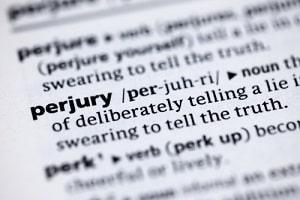What Is “Perjury” and How Can it Impact My Federal Criminal Case?

Being accused of any type of crime can be an unnerving experience. However, when the prosecuting party is the federal government, the situation is even more frightening. If you or a loved one has been charged with a crime relating to child trafficking, sexual exploitation of a child, money laundering, drug trafficking, weapons trafficking, or another federal offense, you may feel completely lost. The first step you should take is to hire an attorney experienced in defending against federal charges. Your attorney will help you avoid making mistakes that worsen your chances of being acquitted. One such mistake that can result in additional federal charges is lying under oath or perjury.
When Can an Individual Be Charged with Perjury?
There are two types of perjury under U.S. law. The first refers to false statements made by an individual who is under oath. In order to convict someone of perjury for lying under oath, the prosecution must prove that the following elements are present:
-
The false statements were made after the individual took a verbal or written oath to deliver truthful testimony. It should also be noted that perjury requires an actual statement. Remaining silent or refusing to answer a question does not constitute perjury, but it may lead to other charges such as contempt of court.
-
The individual knew that the statements were untrue. If the prosecution cannot prove that the individual knew he or she was lying, he or she cannot be charged with perjury.
-
The individual made false statements of his or her own free will. This means the defendant had some choice in how he or she acted and chose his or her behavior.
-
The false statements were material, or relevant, to the legal proceedings during which the statements were made. If an individual lies about something that is unrelated to the case, this is not considered perjury.
The second type of perjury involves “unsworn” statements or statements made by an individual who was not under oath but still had a legal obligation to speak truthfully. Federal law states that when a matter may be established by a sworn statement it may also be established by an “unsworn written declaration under penalty of perjury.” Perjury is punishable by up to five years in prison under federal law.
Contact a Plano, Texas Criminal Defense Attorney
Being convicted of a federal offense can result in life-altering consequences including significant jail time. If you are facing federal charges, you need an attorney who has a proven track record of success. Throughout her career as a Collin County federal criminal defense lawyer, Attorney Darlina Crowder has secured hundreds of not guilty verdicts and acquittals for clients accused of a wide range of offenses. Contact The Crowder Law Firm, P.C. by calling us today at 214-544-0061. Schedule your free, no-obligation consultation and case review today.
Sources:
https://uscode.house.gov/view.xhtml?req=granuleid:USC-prelim-title18-section1623&num=0&edition=prelim
https://uscode.house.gov/view.xhtml?req=(title:18%20section:1621%20edition:prelim)
















